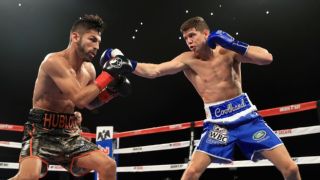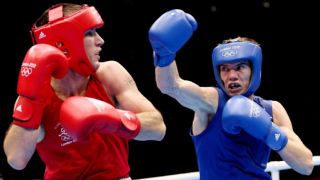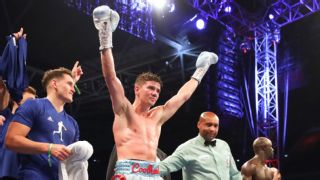LONDON -- Per his own account, Luke Campbell was an angry, chunky, dyslexic boy of 13 when he walked into St. Paul's Boxing Academy in the bleak, northern city of Hull. Two weeks later, he had his first fight.
"I got my ass kicked," he recalls.
In fact, Campbell kept getting his ass kicked, losing seven of his first 10 amateur bouts. Just the same, he kept coming back. As inscrutable as he found the alphabet, something about the gym -- the risks and rhythms of boxing life, perhaps -- made complete sense to him.
"I don't know why," he says. "I just loved it. And I always wanted to be better than I was yesterday."
Although Campbell's grandfather had boxed in Ireland, it wasn't the sort of thing he'd imagined for himself. His brothers hadn't boxed, and unlike so many of his contemporaries, neither had his father.
Bernard Campbell was a miner. He spent his days in artificial light, driving a truck through subterranean tunnels oxygenated with compressed air. He saw his share of industrial accidents down there, but what finally got him out of the mine were the seven disks he had removed from his spine.
"A brutal job," Luke says.
Why then would his father have the need for a brutal sport? Bernard Campbell wasn't even a casual fan. Luke couldn't remember him watching a fight on the television. That all changed once Luke started fighting.

Unlike so many of today's boxing dads, this father would never claim that genetics entitled him to any expertise. But when it came to his second son -- the first was already a career soldier, the youngest would become a fisherman -- he had breathtaking preternatural knowledge. Luke hadn't been in the gym more than a few years when Bernard Campbell issued a proclamation with absolute assurance:
"Come out like a lion," he said. "You're going to win the Olympic gold medal, son."
Luke didn't believe him. And in 2008, after failing to qualify for the Beijing Olympics, he was quick to muffle his disappointment with a chorus of "I told you so."
"You will be an Olympic champion," his father shot back. "You wait and see."
Four years later, at the London Olympiad, it came to pass. Even as the boxing world became entranced with the professional prospects suggested by Vasiliy Lomachenko's second consecutive gold medal, the story in London was Campbell, the first Briton in more than a century to win the Games' bantamweight division.
"Obviously, my father believed in me more than what I could see," Campbell says. In the year or so after his victory, he had two sons with his longtime girlfriend and now wife, Lynsey. He was appointed an MBE (Most Excellent Order of the British Empire) and won a spot on the British celebrity show "Dancing on Ice."
He ended 2013 as a burgeoning prospect, Britain's own golden boy, with a professional record of 4-0.
Bernard Campbell never went to his son's fights. He'd wait until someone told him the result, then watch it back on tape. Still, before each one, he'd see Luke off with the same admonition he'd been giving since his amateur days: "Come out like a lion. Keep your hands high. Get what you deserve. You're going to be a champion."
In fact, "champion" was putting it mildly. By this point, the father's predictions had grown with the son's stature. It wasn't a belt that Bernard promised Luke would achieve. It was all of them, that rarity in boxing: a unified, four-belt champ.
By then, Luke was done arguing with him.
In 2014, his father was diagnosed with cancer. Maybe it was life underground, all that compressed air. There was no way to really tell. Only the course of the disease seemed certain: first the lymph nodes, then the lungs, its path apparently inexorable.
As it turned out, Bernard Campbell was a fighter too.

"It got to the point where everybody in the hospital was calling him 'the Titanium Man' because every time he was on his deathbed, he just bounced back," Luke recalls. "His doctors would say, 'anytime now.' It could be seconds, minutes, hours, a day. And then he just bounced back ... again ... and again. ... It was just a roller coaster full of emotions. It was the end. Then he was back."
It went on like that for years.
"I'm not going anywhere until you win a world title," his father said. The first of four.
Luke believed him. In the summer of 2017, he left to train in the United States, where he would fight Jorge Linares, then ranked among the sport's pound-for-pound best. It was his first title shot.
Two weeks before the fight, he received a call from home. His father had died. Bernard Campbell was 58.
"I was on my own," Luke says. "So I just went for a walk, crying."
He didn't tell anyone outside his camp. He didn't want any excuses, nor did he want anything Linares might construe as weakness. But the truth was, despite the brave face, Luke Campbell had been severely weakened.
"I'd just start getting, like, palpitations, little mini panic attacks," he recalls. "Out the blue, I just start crying my eyes out. ... I would just all of the sudden burst out into tears crying, very draining physically and emotionally."
Campbell went down in the second round.
Then he started fighting.

It ended in a split decision for the champion Linares. If Campbell acquitted himself well (despite circumstances the difficulty of which nobody else knew), the hard part had just begun. He flew back by himself.
"I really didn't want to go home," he says.
Still, two years later, he's home in a way he couldn't have imagined: with another title shot not far from the site of his greatest glory, the London Olympics. All that stands between Campbell, the WBC's No. 1 contender, and three belts is a man widely presumed to be the world's greatest fighter, Lomachenko, who just happens to have been trained by his father since grade school.
Lomachenko is a prohibitive favorite, -2000 according to Caesars. But Campbell's own assets were evident at the first news conference for the fight. Not only does he tower over Lomachenko, but he also has a 5½-inch reach advantage. While Lomachenko -- who acknowledges he isn't a natural lightweight -- had certain difficulties with Linares and the slick-boxing Jose Pedraza, Campbell argues that he's a better boxer than the former and more powerful than the latter.
"I've got really good footwork and fast hands myself," he says. "I can set traps too."
What's more, at 31, under a new trainer in Shane McGuigan, Campbell is coming off what he calls "the best camp of my life."
Finally, there's the father factor. If Lomachenko's father is in his corner, Campbell's is in his boy's heart.
They still communicate, the miner's son from Hull says.
"What does he tell you about Saturday night?" Campbell was asked.
"Same thing as he's always told me. I'm going to get all the belts. And to come out like a lion."
"You believe it this time?"
"This time I believe it."
